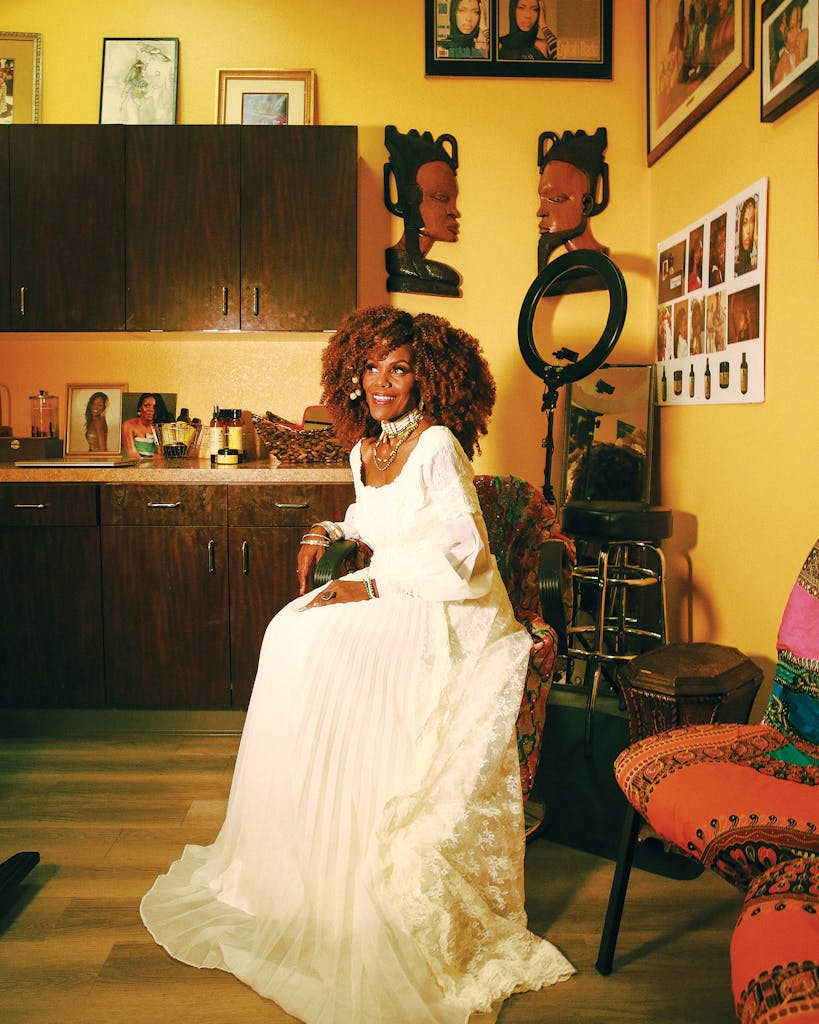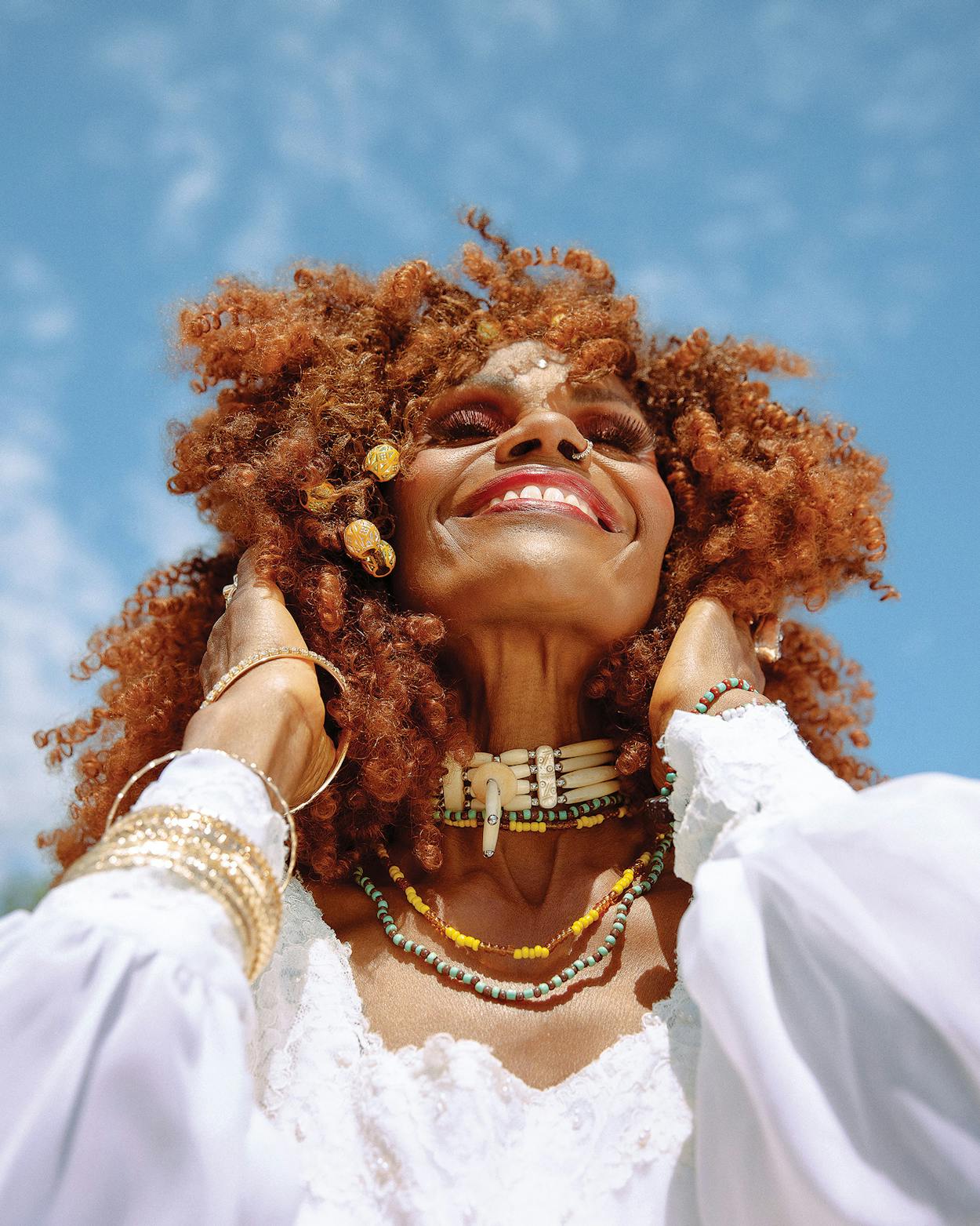In the summer of 2019, Rhetta Andrews Bowers, a Democratic state representative for Dallas County, was approached by a member of the newly formed CROWN (Creating a Respectful and Open World for Natural Hair) Coalition. The national group had been founded by Black women who were fighting discrimination against natural hair and styles such as braids, twists, and dreadlocks. They wanted Bowers to take up their cause in Texas.
Bowers quickly learned that many Black Texans felt that they were being discriminated against at school and at work because of their hair, though some were hesitant to speak up. But a few cases had made national headlines, including those of two high school students near Houston who were suspended in 2020 for refusing to cut their locs and Dakari Davis, a Dallas transit police officer who was suspended that same year for wearing cornrows.
Then there was Isis Brantley. The 64-year-old Dallas braider has been fighting some of the state’s regulations on natural hair styling for three decades—she was arrested, in 1997, for braiding hair without a license. In large part because of her advocacy and legal battles, the state has changed its laws.
With the support of a bipartisan coalition of state House reps and members of the Texas Legislative Black Caucus, Bowers agreed to author the Texas version of the CROWN Act, which easily passed both chambers this session. The bill, which goes into effect September 1, prohibits discrimination based on hair texture or protective hairstyles in workplaces and schools and overrides dress code policies that single out natural hair. Texas is the twenty-second state to enact such legislation.
Bowers considers it a historic victory, one directly connected to Brantley’s legacy. “I stand on her shoulders,” she says of Brantley, whose activism “really speaks to how long we’ve been fighting and advocating for natural hair.”


Brantley was born in Dallas, in 1958, and grew up in Bonton, a historically Black neighborhood on the city’s south side. As a child she learned hair braiding from watching her mother and community elders. She studied drama at what is now the University of North Texas, in Denton, dropping out in the late seventies to help start a theater company. Inspired further by the celebration of Black beauty and hairstyles she would see each week on Soul Train, she began to braid hair out of her home while performing around Dallas.
In 1981, she opened her own salon, African Braiding Studio, across the street from Lincoln High School. Brantley, who uses methods that are gentle on scalps, also invented a lacing technique to camouflage thinning areas. In 1989 she introduced her own line of hair products made from natural ingredients, called Sisters of Isis. She became known as “Queen Isis,” and word spread of her practice. Women began traveling from Austin and Houston for a chance to sit in her chair, but the majority came from her community. Singer Erykah Badu started coming when she was around nine years old and has remained a client for decades.
Brantley moved her business to a cultural center in 1994. There she continued serving clients and began teaching her craft, charging as much as $325 for courses. Her business thrived, but for Brantley, hair braiding has never been just a job; it’s a spiritual and cultural practice that connects her to her African religious roots. She believes it can be a tool to help dismantle what she considers to be centuries of damage that Western beauty standards and laws have done to the hair and minds of Black people. Teaching braiding was a chance to do what she calls “healing through the hair.”
“We talk about the history of the hair so that people can understand that you didn’t just come out of your mother’s womb hating yourself,” says Brantley, who carries herself with an earthy glamour. “That this hair that you’re trying to get to know, or you’re having a hard time getting to know, was enslaved in this country. So when we say, ‘Heal through the hair,’ we have to heal all those past traumas that we have connected to the beauty of our curls and our spirals.”
For all her success, Brantley, without knowing it, was braiding and teaching illegally. To braid hair in Texas, she needed a cosmetology license, which at the time required 1,500 hours of cosmetology lessons on everything from hair coloring to nail care. Such training would have meant at least nine months of school for a full-time student and cost thousands of dollars.
In 1995, a Texas Cosmetology Commission inspector visited the salon and informed her that she would need a license to continue braiding. She received several citations and appeared in court with her lawyer, Thelma Sanders Clardy. Though Brantley argued that hair braiding is an African ancestral practice dating back to precolonial civilizations and shouldn’t be regulated by state laws, she was found guilty of braiding hair and operating a salon without a license and was ordered to pay a $600 fine. Brantley, who was told that state officials had waived the fine, continued practicing. Two years later she was arrested on charges related to not paying the fine and operating illegally.
“It was these white cops that came in there and two Black cops that were undercover,” Brantley tells me, describing the sting operation at her salon. The undercover officers asked for an appointment, then the other cops rushed in, handcuffed her in front of shocked clients, and hauled her off to jail. Brantley was in disbelief. All this over braiding?
Brantley paid the fine, but she still insisted on her right to braid without a license. In the following years, she braided out of her home while continuing to fight for changes to the regulations. She argued that a cosmetology license didn’t make sense for natural hair braiders, who don’t cut hair or use chemicals or dyes. The skills relevant to braiding weren’t even taught in Texas cosmetology schools. “This is my religion,” Brantley told the Austin American-Statesman, in 1997. “I don’t know that there’s such a thing as regulating culture and religion.”
In 2007, following the dissolution of the Cosmetology Commission and the transfer of its duties to the Texas Department of Licensing and Regulation (TDLR), the state reduced the required training for hair braiders to 35 hours. Brantley was grandfathered in and received her license to braid. But she still couldn’t legally teach in her salon. The new rules reclassified braiding as an act of barbering, so to continue teaching, Brantley would need to complete hundreds of hours of barber training and move her salon to a new location that met the physical requirements for a barber school.
For years Brantley lobbied against these rules. Finally, in 2013 she, along with the Institute for Justice, a nonprofit law firm, filed a lawsuit against TDLR. In January 2015 a federal court found that the state’s requirements were irrational and thereby unconstitutional. That same year, Brantley and the Institute for Justice worked with members of the Texas Legislature on House Bill 2717, which deregulated hair braiding in Texas. When Governor Greg Abbott signed the bill into law, Brantley was there. Her two decades of legal battles had come to an end. She had won the ability to braid and teach not just for herself but for every practitioner in the state.

Today, thanks to social media, hair braiders are having their day in the sun. Gone are the days when Black women had to quietly braid hair in their homes to avoid getting caught and fined. Now you can search a hashtag such as #houstonbraider on Instagram and pull up more than 658,000 posts. The good news? Nearly anyone can become a hair braider! The bad news? Nearly anyone can become a hair braider. Among those thousands of posters are talented braiders showing off satisfied clients with waist-length box braids or flowy faux locs. But there are also memes on TikTok in which clients complain about the shoddy workmanship of an inexperienced, overconfident braider.
When I asked Brantley whether she’s concerned that deregulation in Texas has empowered too many subpar braiders, her rebuff was gentle but firm. To her, the freedom outweighs any downsides. “No, I don’t worry about this,” Brantley says. “We have to start from somewhere. Someone wants to braid hair, that’s beautiful. Economics has been stolen from [Black people] over and over and over again. This is an opportunity for us to have the power back in our own hands.”
She has more complicated feelings about her own losses and gains. She spent two decades of her “prime days,” she says, traveling between Austin and Dallas, missing out on time with her five children, all to give more freedoms to Texas braiders. Brantley worries that she’s being forgotten and left behind as the industry explodes.
In April, just before the Texas House passed the CROWN Act, I visited Brantley in her Naturally Isis salon, a small room that’s part of the Salon 972, a collection of Black hair-care businesses in North Dallas. Brantley, bubbly and regal, towered over her two students for the day. She wore silver platform heels and two shimmery yellow head wraps tied around waves of her thin brown Isis Locs—her own take on micro locs. Brantley explained that she used to teach about a dozen students at a time and had many clients, but fewer customers come to her now that anybody can braid hair. So she goes with the flow, practicing gentle braiding techniques, teaching, and spreading her love of natural hair with events such as the Naturally Isis Hair Parade and Festival. She is active on Instagram and TikTok, with a combined 96,000 followers, and in 2021 she produced a short film about her story. “This is where we are, and we can’t hide it,” Brantley says. “Little by little, bit by bit.”
Texas braiders who practice without a license have Brantley to thank, whether they know her name or not. Of course, Brantley would prefer that they do.
This article originally appeared in the September 2023 issue of Texas Monthly with the headline “Her Crowning Glory.” Subscribe today.
- More About:
- Style & Design
- Dallas









